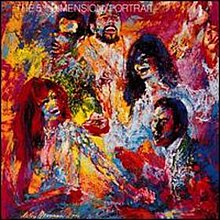Portrait (The 5th Dimension album)
| Portrait | ||||
|---|---|---|---|---|
 |
||||
| Studio album by The 5th Dimension | ||||
| Released | April 1970 | |||
| Recorded | August 22, 1969-March 20, 1970 | |||
| Genre | R&B, pop, soul, sunshine pop, psychedelic soul | |||
| Length | 38:25 | |||
| Label | Bell | |||
| Producer | Bones Howe | |||
| The 5th Dimension chronology | ||||
|
||||
| Professional ratings | |
|---|---|
| Review scores | |
| Source | Rating |
| Allmusic |
|
Portrait is the fifth album by American pop group The 5th Dimension, released in 1970 (see 1970 in music). This is the group's first album for Bell Records, having switched from the Soul City Records (American label). The cover features an impressionistic portrait by famous artist LeRoy Neiman.
The album languished in the mid-60's on the Billboard Top 200 Album Charts after the release of its first three singles, none of which entered the Top 20 of the American pop music charts. Bell Records, hoping to see a return on the investment they made by signing The 5th Dimension after the group's contract at Soul City Records ended, made a fourth and final attempt at a hit - a relatively uncommon practice at the time - with the release of Burt Bacharach and Hal David's "One Less Bell to Answer". The single rose all the way to #2 by Christmas 1970, becoming one of the group's greatest hits of all time. As a result, Portrait began climbing the charts once again, eventually peaking at #20. The single features Marilyn McCoo on lead vocal, and ushers in The 5th Dimension's transition from pop to adult contemporary artists. McCoo from this point becomes the primary vocalist for the group's subsequent chart hits, including "Last Night (I Didn't Get to Sleep at All)", "Love's Lines", "Angles and Rhymes", "If I Could Reach You", "House for Sale", "Everything's Been Changed" and "Flashback". This becomes a source of friction for the group as time goes on, and is in part responsible for McCoo and husband Billy Davis, Jr. leaving the group after the release of Earthbound in 1975.
.
*bonus track on CD
Additional personnel
As mentioned on the liner notes of the album, this was one of the first albums to be recorded on a 16-track recorder, and was recorded at the Wally Heider Studios in Hollywood. The sketches of the vocal recording sessions included in the album cover art are dated January 13 and January 14, 1970.
...
Wikipedia
